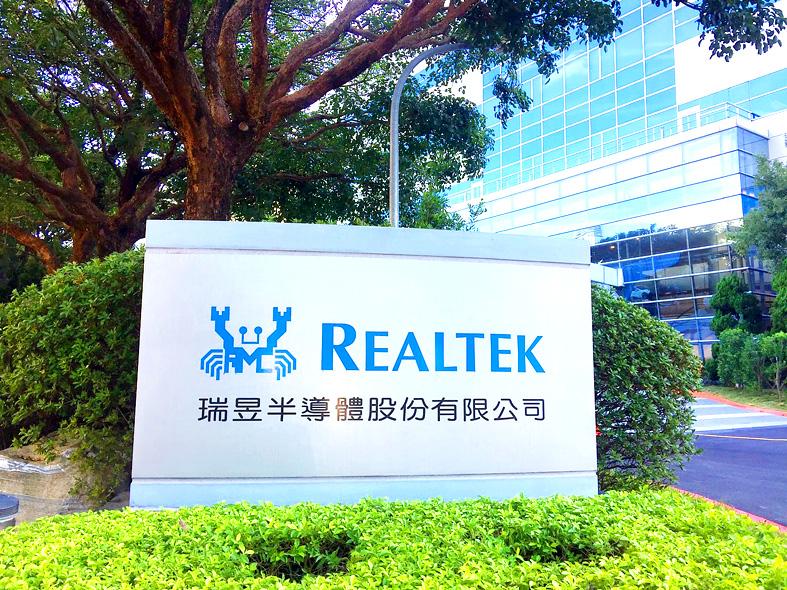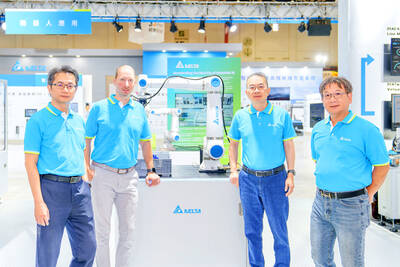Networking chip designer Realtek Semiconductor Corp (瑞昱半導體) plans to invest about NT$7.2 billion (US$256.4 million) in Taiwan, in line with its development strategy, the Ministry of Economic Affairs said on Friday.
The company’s investment is also a demonstration of the robust demand for semiconductors in the post-COVID-19 era, the ministry said in a statement.
Realtek, founded in 1987 at the Hsinchu Science Park (新竹科學園區), is a fabless semiconductor firm that focuses on chips used in products for communication networks, computer peripherals, and devices for multimedia and ultra-wideband communications.

Photo: Grace Hung, Taipei Times
The company plans to build a new office building at the Hsinchu Science Park and another at the Hsinchu Biomedical Science Park (新竹生醫園區) in Hsinchu County’s Jhubei City (竹北) to accommodate IC designers, software and hardware researchers, laboratories and small-scale trial production bases, the ministry said.
Realtek’s investment is in line with its research and development (R&D) and operational needs, and comes as the Internet of Things, cloud computing and artificial intelligence have shown promising commercialization, it said.
Last month, memorychip packaging and testing service provider Powertech Technology Inc (力成科技) said it would invest NT$20 billion in a second production facility at the Hsinchu Science Park.
“Amid US-China trade tensions and the effects of the COVID-19 pandemic, chip products are in short supply, showing that Taiwan holds a key position in the global semiconductor supply chain,” the ministry said.
Realtek on Monday reported record revenue of NT$9.45 billion for last month, up 10.2 percent from May and up 55.46 percent from last year, while revenue in the first half of the year rose 47.84 percent annually to NT$49.18 billion.
Given robust demand across its product catalog and tight capacity along the supply chain, the company said that it was cautiously optimistic in its outlook for the second half of the year.
Realtek’s investment is expected to bolster the already strong R&D capacity of the domestic semiconductor industry, while creating 545 jobs, the ministry said.
Realtek was one of five local companies that the ministry approved last week to join the government’s three-year action plan for domestic investment, and one of 932 companies granted ministry approval — for a total of NT$1.27 trillion to be invested — since the government launched incentive programs at the beginning of 2019.
The firms’ investments are expected to provide 107,240 jobs, while another 55 firms wait for approval, the ministry said.

SETBACK: Apple’s India iPhone push has been disrupted after Foxconn recalled hundreds of Chinese engineers, amid Beijing’s attempts to curb tech transfers Apple Inc assembly partner Hon Hai Precision Industry Co (鴻海精密), also known internationally as Foxconn Technology Group (富士康科技集團), has recalled about 300 Chinese engineers from a factory in India, the latest setback for the iPhone maker’s push to rapidly expand in the country. The extraction of Chinese workers from the factory of Yuzhan Technology (India) Private Ltd, a Hon Hai component unit, in southern Tamil Nadu state, is the second such move in a few months. The company has started flying in Taiwanese engineers to replace staff leaving, people familiar with the matter said, asking not to be named, as the

The prices of gasoline and diesel at domestic fuel stations are to rise NT$0.1 and NT$0.4 per liter this week respectively, after international crude oil prices rose last week, CPC Corp, Taiwan (台灣中油) and Formosa Petrochemical Corp (台塑石化) announced yesterday. Effective today, gasoline prices at CPC and Formosa stations are to rise to NT$27.3, NT$28.8 and NT$30.8 per liter for 92, 95 and 98-octane unleaded gasoline respectively, the companies said in separate statements. The price of premium diesel is to rise to NT$26.2 per liter at CPC stations and NT$26 at Formosa pumps, they said. The announcements came after international crude oil prices

STABLE DEMAND: Delta supplies US clients in the aerospace, defense and machinery segments, and expects second-half sales to be similar to the first half Delta Electronics Inc (台達電) expects its US automation business to remain steady in the second half, with no signs of weakening client demand. With demand from US clients remaining solid, its performance in the second half is expected to be similar to that of the first half, Andy Liu (劉佳容), general manager of the company’s industrial automation business group, said on the sidelines of the Taiwan Automation Intelligence and Robot Show in Taipei on Wednesday. The company earlier reported that revenue from its automation business grew 7 percent year-on-year to NT$27.22 billion (US$889.98 million) in the first half, accounting for 11 percent

A German company is putting used electric vehicle batteries to new use by stacking them into fridge-size units that homes and businesses can use to store their excess solar and wind energy. This week, the company Voltfang — which means “catching volts” — opened its first industrial site in Aachen, Germany, near the Belgian and Dutch borders. With about 100 staff, Voltfang says it is the biggest facility of its kind in Europe in the budding sector of refurbishing lithium-ion batteries. Its CEO David Oudsandji hopes it would help Europe’s biggest economy ween itself off fossil fuels and increasingly rely on climate-friendly renewables. While